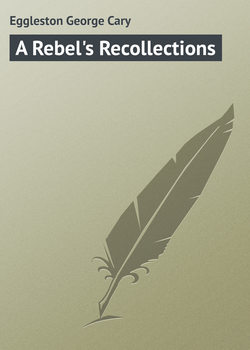Читать книгу A Rebel's Recollections - Eggleston George Cary, Marbourg Dolores - Страница 1
ОглавлениеPREFACE TO THE FOURTH EDITION
"A Rebel's Recollections" was published in 1874. It has ever since enjoyed a degree of public favor that is perhaps beyond its merits.
However that may be, my friends among the historians and the critical students of history have persuaded me that, for the sake of historical completeness, I should include in this new edition of the book the prefatory essay on "The Old Régime in the Old Dominion," which first appeared in the Atlantic Monthly for November, 1875.
I am doing so with the generous permission of Messrs. Houghton, Mifflin, & Co., publishers of the Atlantic Monthly.
The scholars have said to me and to my publishers that during its thirty years of life the book has become a part of that body of literature to which historians must look as the sources of history. They have urged that the introductory chapter, now for the first time included in the volume, is an essential part of that material of history.
The story of the book and of this introductory chapter may, perhaps, have some interest for the reader. In that belief I tell it here.
In the year, 1873, I was editing the weekly periodical, Hearth and Home. I went to Boston to secure certain contributions of literary matter. There, for the first time, I met Mr. William Dean Howells, then editor of the Atlantic Monthly, – now recognized as the foremost creative and critical writer of America.
In the course of our conversation, Mr. Howells asked me why I should not write my reminiscences of life as a Southern soldier. At that time war passions had only just begun to cool, and so I answered that it would be hardly fair to the publishers of Hearth and Home for me in that way to thrust upon the readers of that periodical the fact that its editor had been a Rebel soldier.
"Oh, I didn't mean," answered Mr. Howells, "that you should write your reminiscences for Hearth and Home. I want you to write them for the Atlantic."
I put the matter aside for a time. I wanted to think of it, and I wanted to consult my friends concerning the propriety of doing what Mr. Howells had suggested. Then it was that I talked with Oliver Johnson, and received from him the advice reported in the preface to the first edition of this book, which is printed on another page.
An arrangement was at once made with Mr. Howells that I should write seven of the nine papers composing the book, for publication in the Atlantic, the two other papers being reserved in order to "give freshness" to the volume when it should appear.
After the first paper was published, Mr. Howells wrote me that it had brought a hornets' nest about his ears, but that he was determined to go on with the series.
After the second paper appeared, he wrote me a delightful letter, saying that the hornets had "begun to sing psalms in his ears," in view of the spirit and temper of my work.
After all the papers were published, and on the day on which the book, with its two additional chapters, appeared, there was held at the Parker House in Boston a banquet in celebration of the fifteenth anniversary of the founding of the Atlantic. At that dinner, and without warning, I was toasted as the author of the latest book of Civil War reminiscences. I made a feeble little speech in reply, but I found that the spirit in which I had written "A Rebel's Recollections" had met with cordial response from the New England audience. A company of "original abolitionists" had even planned to give me a dinner, all my own, with nobody present but original abolitionists and my Rebel self.
In the same way the book was received by the press, especially in New England, until I was satisfied that my work had really ministered somewhat to that reconciliation between North and South which I had hoped to help forward.
Some months later, in 1875, I wrote the article on the old Virginian life, and sent it to Mr. Howells. Mindful of his editorial injunction to confine articles to six magazine pages in length, I condensed what I had to say into that space. Then for the first time in my life I had an experience which has never since been repeated. Mr. Howells sent the article back to me with a request that I should double its length.
Some years later, the Authors Club gave a reception to Mr. Howells as our foremost living novelist, and it fell to me, as the presiding officer of the club's Executive Council, to escort the guest of the evening to the club. The war papers of the Century Magazine were at that time attracting a country-wide attention. As we drove to the club, Mr. Howells said to me:
"It was you and I who first conceived the idea of 'War Papers' as a magazine's chief feature. We were a trifle ahead of our time, I suppose, but our thought was the same as that which has since achieved so great a success."
In view of all these things, I inscribe this new and expanded edition of "A Rebel's Recollections" to the true godfather of the book, – to
WILLIAM DEAN HOWELLS,
with admiration for his genius, with a grateful recollection of his helpfulness, and with personal affection.
George Cary Eggleston.
The Authors Club,
January, 1905.
